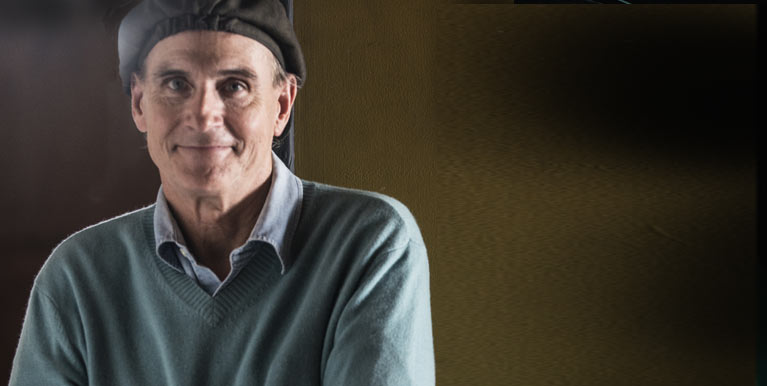BERKSHIREEAGLE.COM — James Taylor on virus’ impact: ‘Life … is going to change’
By Clarence Fanto
LENOX — After the peak of the coronavirus pandemic is reached and we start coming down the other side of the mountain, there will be a new abnormal, less restrictive but still critically different from the pre-virus era. It’s on all of our minds, including Berkshires troubadour James Taylor, as voiced during a wide-ranging conversation from his Montana spring break retreat last weekend.
It has been a busy year for James and Kim Taylor — a $350,000 gift to Berkshire Medical Center for coronavirus response, after a $1 million donation to Massachusetts General Hospital in Boston. His “American Standard” album came out in late February, after the release of “Break Shot,” his retrospective audio documentary on Audible.com that traces his first 21 years.
With the world turned upside down, Taylor didn’t want to dwell on his professional commitments. As confirmed Friday, he had to postpone his coast-to-coast U.S. tour of 27 cities with Jackson Browne slated from May 14 to July 10, including a June 21 date at Boston’s Fenway Park with Brandi Carlile and Shawn Colvin. (The sold-out Tanglewood concert July 4 is still listed on the Boston Symphony Orchestra’s schedule, for now.)
His April 14-May 5, 12-stop Canadian tour with Bonnie Raitt from Victoria, British Columbia, to St. John’s, Newfoundland, had already fallen by the wayside.
“The response to the tours was so fantastic, and we’re bound and determined to reschedule,” Taylor said, adding that both were sellouts as his latest studio recording was released.
“If you’re a touring musician and basically make it your living and focus of your professional life by asking people to come together in big groups and participate in a musical gathering, you’re in the center of how to respond to the threat and what needs to change,” he said.
“This is not about me,” he emphasized, “but it makes me understand and sympathize with people to have my year’s work so completely impacted by it and have a project I worked on for three years dropped into a well. It definitely makes me aware of the economic implications of this thing. You learn to make touring part of your life, you learn to do it well. For us who have devoted so much time in our lives to this process, this is a real disruption; that’s what we’re feeling.”
Here are additional excerpts from my conversation with Taylor, lightly edited for length and clarity:
Q: What are your immediate concerns about the public impact of the pandemic?
A: People are really hurting, that’s the main thing everybody’s been trying to control. This falls on the shoulders of our health care providers and first responders, and we must help them flatten the curve. We wasted two months, maybe three, to prepare for this thing, but the side that’s been in power, they just weren’t there, their heads were in the sand.
The U.S. is supposed to be the world leader, but it has been asleep at the wheel while the rest of the world was showing us what to do. The focus has to be on encouraging good leadership and supporting the health care providers.
Q: What should have been done differently?
A: For many years, I’ve said along with so many other people that there are serious problems with the way our economy works and what it does to our environment, the economic disparity, the increasing struggles of our workforce and the average citizen. There are real problems when we see our for-profit medical system trimmed down to the least excess, a lean operation with no excess capacity.
I really do think we’re going to need a public health “national guard,” maybe the current National Guard expanded in its medical capacity.
Q: Taking the longer view, what else will we confront whenever we return to some kind of new normal?
A: We’re facing really big decisions; deep alterations to the fabric of our lives are being made day to day with only a short period of time to consider them. That’s the nature of the emergency. We know life on the other side of this thing is going to change.
When something like this happens, people scream for change; they ask, “Why aren’t we protecting our brothers and sisters against this kind of capricious reversal of fortune?” We need to prioritize the well-being of the most number of people.
Q: What do you see as the responsibility of the nation’s chief executive?
A: The executive branch is where the rubber hits the road; the executive is supposed to run things. It’s not a matter of politics. There’s a job to be done, and when it’s not done, you can coast only for a while. But, when something comes along needing a timely and capable response, it isn’t there.
We have to get global, because civilization is all about the ability of strangers to cooperate. The corporate structure should serve humanity and the greatest number of us, not divide us into haves and have-nots. That’s common sense.
Q: How do you view your role as a performer after 50 years of recording and touring?
A: When we give a concert, I feel a community that convenes and reconvenes, without an agenda or political force. It feeds itself, a mutually beneficial thing, and our concerts are one of the ways this happens. That’s a real privilege, the blessing of a lifetime that we have this audience. I’ll be there for them as long as I possibly can.

